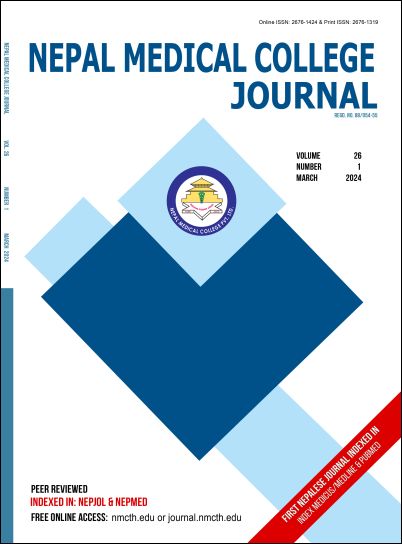Comparison of Post-operative Pain with and without Infiltration of Bupivacaine Hydrochloride in Tonsillectomy
DOI:
https://doi.org/10.3126/nmcj.v26i1.63874Keywords:
Bupivacaine, post tonsillectomy pain, tonsillectomyAbstract
Tonsillectomy is the complete removal of a tonsil from its bed and is one of the most common procedures in Otorhinolaryngology. The intensity of post-operative pain is severe enough to cause dysphagia which subsequently leads to infection of the fossa and other complications. Several studies on pain management have been conducted but not a single standard protocol currently exist. This study aims to evaluate the intensity of post tonsillectomy pain and to assess the efficacy of infiltration of Bupivacaine on the tonsillar fossa following tonsillectomy. A comparative study was conducted at Kathmandu Medical College, ENT-HNS department for a period of 18 months (January 2018 to June 2019). Ninety three patients were included. 2.5 ml of 0.5% Bupivacaine was infiltrated in right tonsillar fossa after tonsillectomy in all patients. The lateralization and intensity of pain at various post-operative period was assessed using visual analogue scale. The requirement of extra analgesics at various post-operative period was recorded. The pain score on the Bupivacaine side on the first and second post-operative day was decreased as compared to the other side. The pain score on the fourth hour and third post-operative day on Bupivacaine side was more than that of the other side. Infiltration of Bupivacaine over the tonsillar fossa has provided a good result with a significant reduction of pain in first post-operative day and in early post-operative period. However, other multi-centered and double blinded study is requires to provide better results.
Downloads
Downloads
Published
How to Cite
Issue
Section
License
Copyright (c) 2024 Nepal Medical College Journal

This work is licensed under a Creative Commons Attribution 4.0 International License.
This license enables reusers to distribute, remix, adapt, and build upon the material in any medium or format, so long as attribution is given to the creator. The license allows for commercial use.




